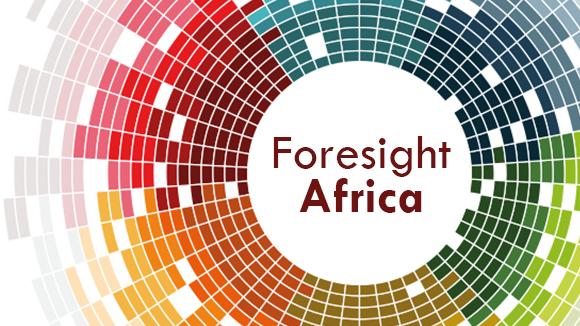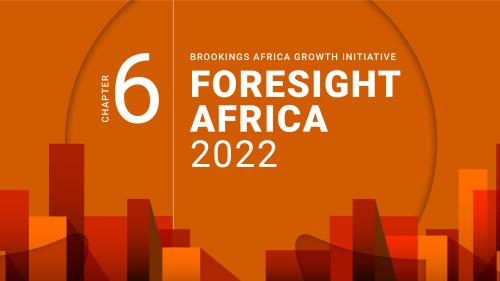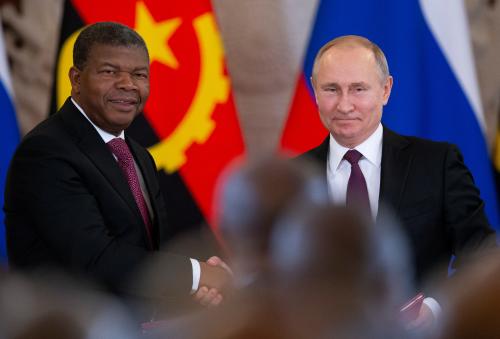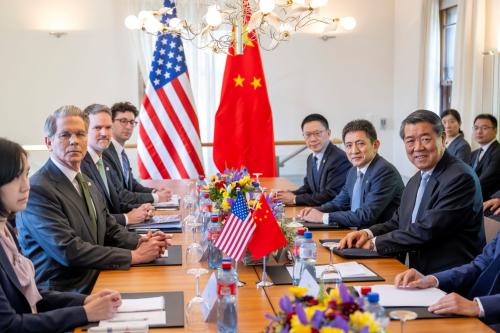Below is a viewpoint from the Foresight Africa 2022 report, which explores top priorities for the region in the coming year. Read the full chapter on Africa’s external relations.
 The COVID-19 pandemic, the United Kingdom’s post-Brexit economic and political orientation towards the Asia-Pacific, and cuts in development assistance all appear to have widened the political and economic distance between the U.K. and Africa in recent years. But these changes are part of a long-term trend of a slow decline in the relationship: For example, Africa’s share of U.K. imports has fallen from 2.1 percent to 1.7 percent over the last 10 years (ONS).
The COVID-19 pandemic, the United Kingdom’s post-Brexit economic and political orientation towards the Asia-Pacific, and cuts in development assistance all appear to have widened the political and economic distance between the U.K. and Africa in recent years. But these changes are part of a long-term trend of a slow decline in the relationship: For example, Africa’s share of U.K. imports has fallen from 2.1 percent to 1.7 percent over the last 10 years (ONS).
The trade, aid, and financing environment within Africa is also changing: Despite delays in its negotiation and implementation, the African Continental Free Trade Area (AfCFTA), under which trading began in 2021, represents a significant opportunity for many African countries to transform their economies and develop regional value chains, reducing reliance on trade and investment with the U.K. and other traditional partners.
Both Africa and the U.K. can benefit from a reversal of this trend. Indeed, given the dynamism of many African economies, technological innovations, and the climate change challenge, stronger strategic engagement with Africa is essential for the U.K., now more than ever. From a commercial point of view, demand from Africa is not only increasing but also becoming more sophisticated as its middle class expands. This growth generates medium- and long-term opportunities for investment in critical sectors such as business services, in which the U.K. has substantial expertise.
Moreover, the green transformation of the U.K. economy towards net zero will require the creation of partnerships with many African countries to ensure access to critical inputs, such as rare earth minerals. Importantly, this access needs to be built on the transformation and development of African economies themselves: The U.K. should reconsider its lack of an import policy beyond trade preferences and its recent cuts to support for economic transformation.
The COVID-19 pandemic, the United Kingdom’s post-Brexit economic and political orientation towards the Asia-Pacific, and cuts in development assistance all appear to have widened the political and economic distance between the U.K. and Africa in recent years.
On the African side, the negotiators of AfCFTA and African policymakers must better consider and design additional policies to develop the enabling environment modern firms require. Such policies should include the provision of critical essential services (e.g., energy), adequate infrastructure, and other business environment aspects. Moreover, the provision of modern services such as business, financial, insurance, and technological services is key for the success of modern firms as well as the development of regional and continental value chains. The U.K.’s investment and expertise in all these sectors can play a useful role.
Importantly, the creation of new and the strengthening of old partnerships between the U.K. and individual African economies must be at the center of the U.K.’s global economic and political strategy. The U.K. might need to be flexible: These partnerships should be developed and implemented within the context of the AfCFTA and Africa’s own ambitions. Indeed, the U.K.’s support to the implementation of the AfCFTA constitutes a significant first step that must be supplemented by further action to put the relationship with the continent at the center of the U.K.’s geopolitical strategy over coming decades.
The Brookings Institution is committed to quality, independence, and impact.
We are supported by a diverse array of funders. In line with our values and policies, each Brookings publication represents the sole views of its author(s).







Commentary
UK-Africa relations: The need for an urgent reset
February 15, 2022